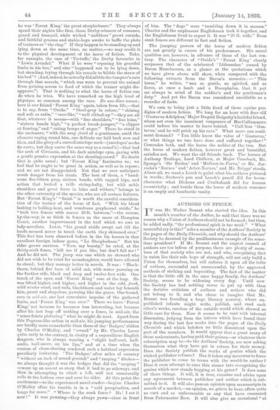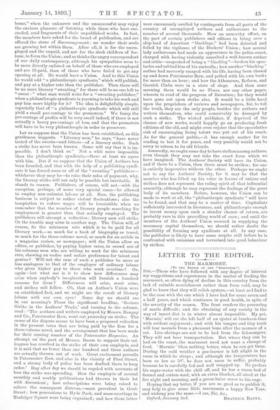AUTHORS ON STRIKE.
IT was Mr. Walter Besant who started the idea. In this month's number of the Author, he said that there was no reason why a Union of Authors should not be formed ; but then, he added sadly, "the professional spirit is too weak." "What mournful cry is this P " asks a member of the Authors' Society in the pages of the Daily Chronicle, and why should the Authors' Society be daunted by the pusillanimous example of its some- time president ? If Mr. Besant and the august council of authors are too infirm of purpose, there are plenty of mem- bers of that society who are not, and who, recognising that in union lies their sole hope of strength, will not only build a Union for themselves, but will enforce it upon all the tribe of authors, successful and unsuccessful, by the approved methods of striking and boycotting. The fact of the matter is that the little rift in the once happy family, the Authors' Society, seems to be widening every day. Until now the Society has had nothing worse to put up with than the derisive criticism of authors and writers who did not belong to it, and who chose to imagine that Mr. Besant was founding a huge literary nursery, where un- published infants might write, publish, and read each other's works, careless of the outside world which showed so little care for them. Now it seems to be rent with internal dissension, judging from the letters which have found their way during the last few weeks into the pages of the Daily Chronicle and which betoken no little discontent upon the part of the members. It would appear that a great many of thke malcontents, having paid their guinea—or whatever their subscription may be—to the Authors' Society, are now asking themselves what they have got in return for their money. Does the Society publish the works of genius which the wicked publisher ref uses P Has it taken any measures to force the publisher to come to terms with the would-be author ? Does it even attempt to coax this sinner into recognising the genius which now stands begging at his gates ? It does none of these things. It will, it is true, examine and advise upon any agreement between publisher and author which is sub- mitted to it. It will also pass an opinion upon manuscripts in search of a market,—an opinion, we grieve to hear, often quite as curt and as unfavourable as any that have emanated from Paternoster Row. It will also give an occasional "at home," when the unknown and the unsuccessful may enjoy the envious pleasure of listening while those who have suc- ceeded, read fragments of their unpublished works. In fact, the members have asked for the bread of publication, and are offered the stone of discouragement: no wonder their souls are growing hot within them. After all, it is for the unem- ployed and the unpaid, and not for the sleek children of for. tune, to form the Union; and so thinks the angry correspondent of our daily contemporary, although his sympathies seem to be more directly enlisted on behalf of those who are employed and are ill-paid, than of those who have failed to get any opening at all. Ho would have a Union. And to this Union he would add "a philanthropic syndicate," which will publish, and pay at a higher rate than the publisher. Then there will be no more literary "sweating," for there will be no one left to " sweat : " what man would write for a "sweating publisher," when a philanthropic syndicate is yearning to take his work and pay him more highly for it? The idea is delightfully simple, especially that of "a philanthropic syndicate which will still yield a small per-centage to the promoters." We fancy the per-centage of profits will be very small indeed, if there is not actually a heavy per-centage of loss, and that the promoters will have to be very philanthropic in order to persevere.
Let us suppose that the Union has been established, as this gentleman suggests. "Literary men," he says, "have never tasted of the sweets—and bitters—of a literary strike. Such a strike has never been known. Some will say that it is im- possible. I don't think so." Not a whit more impossible than the philanthropic syndicate,—there at least we agree with him. But if we suppose that the Union of Authors has been founded, and that with the help of a publishing syndi- cate it has forced some or all of the "sweating" publishers— whichever they may be—to raise their rates of payment, why, the literary strike will not only be possible but inevitable. It stands to reason. Publishers, of course, will not—with the exception, perhaps, of some very special cases—be allowed -to employ non-unionist labour at all. Now, the publishing business is subject to rather violent fluctuations ; also the temptation to reduce wages will be irresistible when we remember that the number of literary people searching for employment is greater than that actually employed. The publishers will attempt a reduction ; literary men will strike. 'Or the trouble may arise in another way. The Union will, of course, fix the minimum rate which is to be paid for all literary work,—so much for a book of biography or travel, so much for the three-volume novel, so much for an article in a magazine review, or newspaper; will the Union allow an editor, or publisher, by paying higher rates, to crowd out of his columns men who are willing to work for the minimum rate, showing an undue and unfair preference for talent and genius ? Will not the case of such a publisher be more or less analogous to that of the employer of ordinary labour who gives higher pay to those who work overtime ? Or, again—but what use is it to show how differences may arise when anybody's imagination will furnish a hundred reasons for them Differences will arise, must arise, and strikes will follow. Oh, that an Author's Union were an established fact, and we might see the revolt of literary tabour with our own eyes ! Some day we should see in our morning's Times the significant headline, Serious Strike in the Authors' Trade,' and turning to the column, read : The authors and writers employed by Messrs. Bungay and Co., Paternoster Row, went out yesterday on strike. The cause of the dispute seems to have been a proposed reduction in the present rates that are being paid by the firm for a three-volume novel, and the arrangement that has been made tor their coming number of the Paternoster Magazine. An attempt on the part of Messrs. Bacon to support their col- leagues has resulted in the strike of their own employes, and it is said that no fewer than one hundred and three authors are actually thrown out of work. Great excitement prevails in Paternoster Row, and also in the vicinity of Fleet Street, and a strong betty of police has been drafted there to keep order.' Day after day we should be regaled with accounts of how the strike was spreading. How the employes of several monthly and weekly publications bad thrown in their lot with discontent ; bow subscriptions were being raised to relieve the consequent distress,—most prevalent in Grub Street ; how processions to Hyde Park, and mass-meetings in Trafalgar Square were being organised; and how these latter were enormously swelled by contingents from all parts of the country of unemployed authors and authoresses to the number of several thousands. How an unworthy effort, on the part of certain publishers and editors to bring over a ship-load of American "blacklegs," had been detected and foiled by the vigilance of the Dockers' Union ; how several lady authoresses had made an appearance in the police-court, charged with having violently assaulted a well-known author and critic—suspected of being a "blackleg "—broken his spec- tacles and robbed him of his umbrella ; how another " blaokleg " author had narrowly escaped with his life, having been chased up and down Paternoster Row, and pelted with his own books for more than an hour; and how the Athenteum, Reform, and Garrick Clubs were in a state of siege. And then some morning there would be no Times, nor any other paper, wherein to read of the progress of literature ; for they would have gone out upon strike also. It would be a little hard upon the proprietors of reviews and newspapers, for, to tell the truth, they are the only people, besides the authors and writers themselves, who could conceivably be damaged by such a strike. The wicked publisher, if deprived of the chance of new works, would happily go on producing fresh editions of the old, and might even rejoice that the speculative risk of encouraging living talent was put out of his reach. As for the general public,—it has enough matter for its reading to last it for years, and very possibly would not be sorry to return to its old friends.
Assuredly, we ought some day to have strikes among authors, even though they may not take the exact form which we have imagined. The Authors' Society will have its Union, and if there be a Union, then there must be strikes ; for one is entirely inoperative without the other. Perhaps we ought not to say the Authors' Society, for it may be that the member who has lifted up his voice in favour of unions and strikes does not represent the ruling spirit of that influential assembly, although he may represent the feelings of the great body of its members. Before, however, the Union can be made to work at all, the "philanthropic syndicate" will have to be found, and that may be a matter of time. Capitalists sufficiently interested in literature, and philanthropic enough to invest money upon such a slender chance of return, are probably rare in this grovelling world of ours ; and until the members of the Authors' Union succeed in supplying the necessary capital themselves, we should rather doubt the possibility of forming any syndicate at all. In any case, the publisher is likely to have some respite still before he is confronted with unionism and terrorised into good behaviour by strikes.



































 Previous page
Previous page